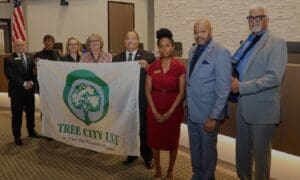Fayetteville, Fayette County’s commercial center, during the years of the recession suffered more than any municipality in the county. A report from the city’s finance staff at the City Council retreat held Tuesday signaled that the severe financial hit may be coming to an end.
In fact, City Manager Joe Morton characterized the previous fiscal year as “probably the most positive financial year we’ve had in recent memory.”
With all the city’s cost reduction measures headed by the early retirement program, and department heads ending the year with additional savings, the city added nearly $1.2 million to its unassigned fund balance, Morton noted.
The early retirement program saved more than $600,000 as seven employees fully retired and another nine came back on for part-time pay as several fulltime positions were left vacant and job duties were consolidated among current staff, according to City Finance Director Lynn Robinson.
The budget presentation included a report on financial trends and analysis and the customary look at the coming year and a five-year forecast.
A general fund overview showed a continued recovery in most revenue sources. Local option sales tax (LOST) receipts in 2013 increased 2.98 percent over actual receipts from 2012. Property tax revenues in 2013 also saw improvement, showing an increase of 1.1 percent over the prior year.
Looking ahead to the FY 2015 budget that begins in August, projections show a 2.39 percent increase in the tax digest, a 2 percent increase in sales tax revenues, a 2 percent increase in licenses and permits, a 1 percent increase in franchise taxes and a 2 percent increase in business and other taxes.
Projections for expenses in FY 2015 show an employee salary increase of 2.4 percent, the hiring of one police officer and an increase of 2.4 percent for operating and maintenance, which includes operational costs for a new fire station on Veterans Parkway along with uniforms and equipment.
Fayetteville during the recession began the trend of reducing staff positions. It was in 2008 that the city’s payroll included 163 full-time equivalents (FTE). Today, that number is 116 FTEs.
Looking ahead at the next five years, finance staff projected revenues to grow incrementally from the current $9.71 million to $10.951 million in 2019.
Expenditures during the five-year period are projected to include 2.4 percent staff raises, the addition of three police officers and three firefighters and a 2.4 percent increase in operational costs, uniforms and equipment for the planned west side fire station.
Another five-year recommendation by finance staff was to increase water and sewer rates by 2.4 percent to reflect the Consumer Price Index for the Southeast region. Staff said potential increases should be reviewed annually to maintain cash flow and meet debt service requirements.
If acted on by the council at a later date, a 2.4 percent increase would represent a $1.23 increase to the average residential customer.
Viewed from a more historic perspective, the city’s local option sales tax revenue over the past few years mirrored the effects of the recession and the incremental economic recovery. The growth seen in 2006 was followed by more than a 10 percent decrease in sales tax revenues in 2007. Revenues continued to fall in 2008 and 2009, by approximately 10 percent, only to see a large jump in receipts in 2010. The city has seen incremental increases in sales tax revenues since 2011.
The status of the city’s tax digest has seen only the beginnings of a rebound from the onslaught of the recession. It was back in 2008 when the city saw its last increase in property values. The largest drop in the digest came in 2012 when property values dropped 12 percent over the preceding year. The downward trend eased in 2013 when the digest dropped just over one percent.












Leave a Comment
You must be logged in to post a comment.